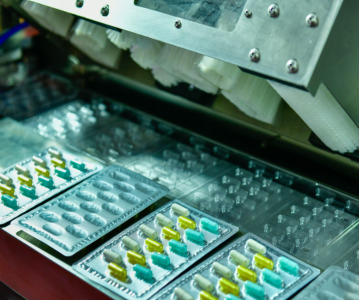Magic mushrooms could be used to treat mental health conditions
.png)
A compound found in magic mushrooms, psilocybin, could be used to treat mental health conditions and help patients suffering with severe depression, as shown by the results of the largest study of its kind to date.
In the latest results from a study from COMPASS Pathways, the main ingredient in ‘magic’ mushrooms has been found to reduce symptoms of depression.
This clinical trial was the largest to date to look at the compound, involving 233 patients diagnosed with ‘treatment-resistant’ depression. Treatment-resistant depression is defined as when the patient has not benefitted from the application of at least two antidepressants.
The compound in question is psilocybin, a psychoactive ingredient found in over 200 species of fungi.
The patients involved in the Phase II double-blind trial each received psychological support and then either a 25 mg or 10 mg dose of psilocybin at random, and those in the control group a 1 mg dose.
Psilocybin is thought to affect the areas of the brain that are involved in processing emotions.
When the compound was administered to patients, under controlled conditions, it was reported that they entered a dream-like state, lasting between 4 and 6 hours.
The results, published in The New England Journal of Medicine, show that those who received the higher dose of psilocybin, 25 mg, demonstrated a significant decrease in depressive symptoms after 3 weeks of treatment (the primary end point), compared to those in the lower dose treatment groups. In this 25 mg dose group, the incidence of remission in patients was 29%, compared to 9% and 8% in the 10 mg and 1 mg groups respectively.
However, between weeks 3 and 12 of treatment (with 12 weeks being the secondary end point), the difference in response between the groups was not statistically significant. Overall in the 25 mg study group 16% of patients showed a sustained response, i.e a response that was held from week 3 through to week 12.
The trial's findings are positive but not ground-breaking, advised Ravi Das, associate professor at the University College London Institute of Mental Health, UK.
"There were an uneven number of severely depressed patients in each group; with significantly fewer severely depressed people in the apparent 'effective' (25mg) dose group. This does not appear to be acknowledged in the paper."
The trial wasn’t without concerns, several of the patients experienced adverse side effects; in the 25 mg group patients reported headaches (24%), nausea and dizziness and fatigue. In a smaller proportion, severe adverse effects were reported, including suicidal ideation, intentional self-harm behaviour and hospitalisation due to severe depression.
By studying depression, suicidality is going to be a feature of the illness course, stated Guy Goodwin, chief medical officer at COMPASS Pathways (London, UK).
"Our hypothesis is that the differences are by chance...but we can only settle this by doing further experiments."
Goodwin also mentioned that the compound was being tested in two other late-stage trials looking at its effectiveness as a treatment for PTSD and anorexia nervosa, with hopes the results could be released at the end of 2024.
The use of these drugs for treatment of mental health conditions remains controversial, but the latest research shows that it worth investigating further.
Related News
-
News A Day in the Life of Oncology Start-Up Co-Founder & CEO
This Women's month we are highlighting stories of women in the pharma industry (building on what we do every month to support women), so for the Day in the Life of we are speaking to Sharon Cunningham who is the Co-founder and CEO of Shorla On... -
News Women in Pharma: Manufacturing personal and team success
Our monthly Women in Pharma series highlights the influential lives and works of impactful women working across the pharmaceutical industry, and how the industry can work towards making the healthcare industry and workplace more equitable and inclusive... -
News A Day in the Life of a Head of Market Insights in med devices
The latest interview in the Day in the Life of Series is with Alper Hulusi, Head of Market Insights for ClariMed. Hulusi also works to try to get to know people, this time from the other side of pharma – the people that will be using the the... -
News CPHI Podcast Series: Packaging expert perspectives at Pharmapack 2025
This month's podcast episode sounds a little different, covering the latest event in Paris – Pharmapack 2025. Digital Editor Lucy Chard speaks to several experts direct from the floor of the show, bringing you right in on the action.&nbs... -
News Vertex Pharmaceuticals stock jumps as FDA approves non-opioid painkiller
UK-based Vertex Pharmaceuticals saw their stock shares soar as the US FDA signed off on the non-opioid painkiller Journavx, also known as suzetrigine, for patients with moderate to severe acute pain, caused by surgery, accidents, or injuries. -
News The 2025 Pharmapack Awards: recognising innovation and patient centricity
This year in Paris the Pharmapack Awards recognised the achievements across categories in the industry, aswell as including some new categories to highlight exceptional work and people. -
News Pharmapack 2025: From the Floor in Paris
Pharmpack gears up for another week in Paris at the Porte De Versailles. The two-day show taking place on the 22–23 January, will cover contract packaging, device innovation, and sustainability among other topics. -
News Visibility, Integration, and Opportunity with CPOs: A Pharmapack Interview
At Pharmapack 2025 in Paris the informative content tracks this year will feature a Contract Packaging track. A critically important topic for those working in the field, which speaker Alexander Schäfer from Sharp Services discusses in the fo...
Recently Visited
Position your company at the heart of the global Pharma industry with a CPHI Online membership
-
Your products and solutions visible to thousands of visitors within the largest Pharma marketplace
-
Generate high-quality, engaged leads for your business, all year round
-
Promote your business as the industry’s thought-leader by hosting your reports, brochures and videos within your profile
-
Your company’s profile boosted at all participating CPHI events
-
An easy-to-use platform with a detailed dashboard showing your leads and performance







